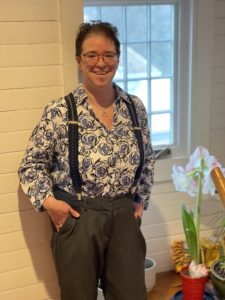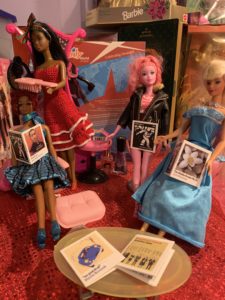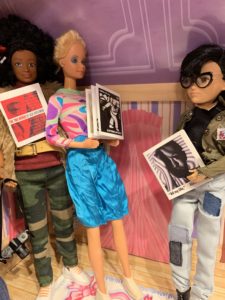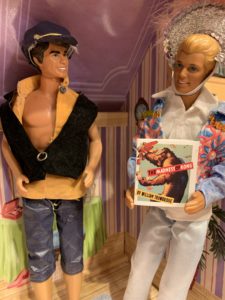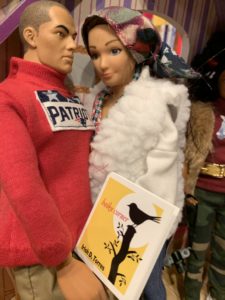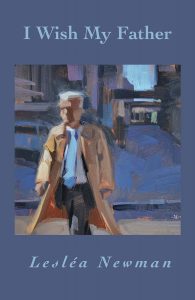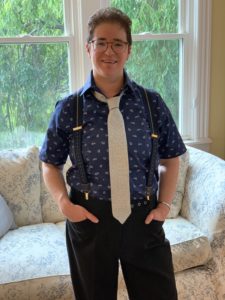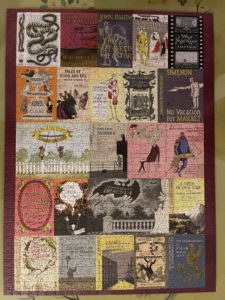As February is Black History Month, let’s start our links roundup with a nod to 20th-century African-American historian Edgar Toppin (1928-2004), who persuaded President Ford to institute this official commemoration in 1976. Never heard of him? Well, that shows why we need to teach more Black history! I discovered his story at the progressive politics blog Lawyers, Guns & Money, in historian Erik Loomis’ series “Erik Visits an American Grave”:
Born in 1928 in Harlem, Toppin grew up in a literate but poor Black family, one that really struggled through the Great Depression, as so many did. His parents were Caribbean immigrants. Named for Edgar Allan Poe, Toppin loved books and would escape to the roof of the building where he lived to read in some peace. The young boy was quite bright and started at City College at the age of 16. Then Howard University came offering a scholarship and he finished his undergraduate career at that august institution of Black learning. He completed his Bachelor’s in 1949 and Master’s in 1950. He then went on for his Ph.D. in History at Northwestern, which he completed in 1955.
Toppin dedicated his career to teaching Black history in a nation that was pretty uninterested in that during these years. He started teaching at Virginia State University, a historically Black institution, in 1964. Soon after, he starting using the power of television to teach Black history, creating a 30 episode program called Americans from Africa. His early publications were on Black politics in Ohio, but he never published a book on what evidently was his dissertation topic. Instead, his publications were centered around big public history books to reach the masses about Black history. They included A Mark Well Made: The Negro Contribution to American Culture, published in 1969, A Biographical History of Blacks in America Since 1528, published in 1971, and The Black American in United States History, published in 1973.
Toppin’s greatest achievement though was the creation of Black History Month. This was an idea that went back at least to the great Black educator Carter Woodson. A Black History Week had been created, but it was largely ignored except in specific circles and what is a week anyway. In 1976, Toppin was president of Association for the Study of African American Life and History (ASALH). This is the premier Black history professional organization, then and now. As president, he lobbied the Ford administration to proclaim a national Black History Month. Ford, seeking Black votes, decided this was a good idea and that year, Ford announced it. It has of course today become central to our national study in history, both publicly and in the school system.
Dramatist Tarell Alvin McCraney is best known for writing the play that became the Oscar-winning film Moonlight, a beautiful and heartbreaking story of a Black gay youth coming of age in a community bedeviled by drugs and toxic masculinity. In this interview at The Creative Independent, he shares a vision of success that doesn’t depend on fame and money:
I say that you really have to find the way for that art to make you happy without it or you necessarily being celebrated.
If you need to be celebrated, that’s not the same thing as being an artist. Yes, artists like to be celebrated, but again, that’s a fleeting pleasure. That pleasure is not going to sustain you, because the moment you’re celebrated for one thing, then everybody’s always waiting on the next thing. If you’re expecting that work to be just as celebrated as the thing you did before, then you get into this habit of just trying to make the same thing over and over again. And again, you’re chasing being celebrated, and not the intimacy and impulse of what you created or what you’re trying to create and communicate, which is what you really want to do.
Personally I’ve always known that if I could have a house and do little plays in the backyard for me and around 15 people, I’m pretty sure I could be happy for the rest of my life. You have to find what that is for you. You have to find that patch of “I could be happy for the rest of my life doing X” for you… and then follow it.
The #MeToo scandals of the past few years have really brought home the realization that the gatekeepers of literary “success” are far from infallible. The latest drama that I encountered on Twitter this morning comes from Poetry Magazine’s questionable decision to publish convicted sex offender Kirk Nesset in their special issue dedicated to incarcerated poets. UK newspaper The Guardian summarizes:
The US’s prestigious Poetry magazine has doubled down on its decision to publish a poem by a convicted sex offender as part of a special edition dedicated to incarcerated poets, telling critics that “it is not our role to further judge or punish [people] as a result of their criminal convictions”.
The magazine, which has been running since 1912 and is published by the Poetry Foundation, has just released its new issue focusing on work by “currently and formerly incarcerated people”, their families and prison workers. It includes a poem by Kirk Nesset, a former professor of English literature who was released from prison last year after serving time for possessing, receiving and distributing child sexual abuse images in 2014. The investigation found Nesset in possession of more than half a million images and films of child sexual abuse.
When a reader asked why the issue included Nesset, Poetry magazine said that its guest editors “didn’t have knowledge of contributors’ backgrounds”, because “the editorial principle for this issue was to widen access to publication for writers inside prison and to expand access to poetry, bearing in mind biases against and barriers for incarcerated people”.
In response, hundreds of writers have signed a petition asking the prestigious journal to remove Nesset’s work:
For their February 2021 issue of Poetry Magazine, “The Practice of Freedom,” editors have chosen to publish the work of convicted pedophile Kirk Nesset, a man who watched infant rape and the rape of 6,7,8-year-old girls for pleasure. When arrested, Nesset was in possession of over half a million images of child pornography and had circulated these images.
“This case is unbelievable,” Assistant U.S. Attorney Christian Trabold said during Nesset’s Feb. 2016 sentencing. “It is the most child pornography that I have seen in 15 years as a federal prosecutor.” (allegehenycampus.com)
This petition calls for Poetry Magazine to remove Nesset’s work from their pages and their website. That such an established publication would use their widely-read and highly selective platform to further the work and career of a predator cannot be labeled an oversight, nor defended. It is an offensive and a destructive misuse of power… The reward and high-standing that comes with publishing in such an esteemed magazine should be withheld from someone who has relished the torture and degradation of innocent children, some only months old.
I’m still sorting out what I think about this issue. No one has a “right” to be published, and pulling a problematic work is not censorship or “cancel culture”. On the other hand, supporting prisoners means supporting all prisoners, not only those who are innocent, nonviolent, or serving unjustly long sentences. Some people are there because they did very bad things. This doesn’t change the fact that the American prison system is abusive, and that abuse thrives on cutting off prisoners’ ability to communicate with the outside world. On the other, other hand… poet Shaindel Beers’ comment on her petition signature is pretty persuasive:
Poetry Magazine needs to apologize for including Kirk Nesset in this issue. “Prison writing” issues of literary journals are meant to publish marginalized voices. Nesset is not a marginalized voice. Until he was arrested for child pornography, he was a professor with books published. He had something like A HALF MILLION files of child pornography on his computer. He specifically took his Pomeranian dog everywhere with him because it was a way to strike up conversations with children. This is not a “prison writing program” issue. He was a professor already. He’s not a marginalized voice. He’s a privileged person who suffered consequences for horrible crimes.
Philosopher Sara Ahmed’s post “Killjoy Commitments” on her Feminist Killjoys blog touches on this question of who deserves to be heard. Her New Year’s resolution: “I recommit myself to the task of explaining what I oppose without elevating what I oppose as a position worthy of being debated.” Challenging inequality often means defending one’s existence (again). Yet the constant need to debate dehumanizing views is itself part of the inequality. This especially comes up in the rebranding of transphobia as “free speech”. Privileged people love to come up with intellectual-sounding theories about why sexual harassment, misgendering, and other verbal aggression are simply “ideas” that they should be allowed to discuss ad infinitum.
While I would like to restrict the amount of mental energy I give to our home-grown fascists, I also don’t want to be one of those white people who declares victory and goes home because Biden got elected. We have to analyze the appeal of this dangerous movement so we’re not blindsided again in the next election. Rev. Susan Russell, a longtime voice for LGBTQ equality in the Episcopal Church, blogged recently about “The Role of Toxic Religion in Dismantling Democracy”:
Make no mistake about it: it is a very short journey from “the Bible said it, I believe it, that settles it” to “my country, love it or leave it” – with a direct connection to the rise of nationalism, sexism, white supremacism and the rest of the litany of isms that plague our nation and our world: the rise of the forces we struggle against daily as we live out our baptismal promise to persevere in resisting evil and the forces that have assembled to create the climate of violent extremism that fueled the assault on our Capitol, our Congress and our Democracy.
What we saw in sharp relief on our televisions and twitter feeds on January 6 — and continue to fight against in our body politic — is the effect of an anti-fact virus epidemic super-spreading in a population pre-programmed to believe fact-based science is an enemy of faith.
On a related note, this article by Reed Berkowitz at Medium is a longread that’s worth your time: “A Game Designer’s Analysis of QAnon”. He breaks down how conspiracy-mongering sites build immersive worlds and exploit the human brain’s craving to project patterns onto random data. Solving fake mysteries produces an addictive high:
There is no reality here. No actual solution in the real world. Instead, this is a breadcrumb trail AWAY from reality. Away from actual solutions and towards a dangerous psychological rush. It works very well because when you “figure it out yourself” you own it. You experience the thrill of discovery, the excitement of the rabbit hole, the acceptance of a community that loves and respects you. Because you were convinced to “connect the dots yourself” you can see the absolute logic of it. This is the conclusion you arrived at. More about this later.
Finally, I appreciated this sensitive article in the Harvard Divinity School Bulletin by psychiatric chaplain Jeremy D. Sher: “Chaplain, Can You Do an Exorcism?” Sher has the humility to work within the patients’ own worldviews, rather than forcing them to translate their demons into secular therapeutic constructs or debating their theology. Taking at face value the patient’s framework for her auditory hallucinations, the chaplain allows those voices to be heard, often leading to resolution of the patient’s fear and self-harm impulses. As a Jewish practitioner working with mostly Christian patients, Sher notes with some self-deprecating humor that one person’s faith is another’s delusion.
The question of the existence of the characters in the patient’s hallucinatory experience is not the topic of what the patient is saying. The patient is trying to tell us about their problems through an illustrative story within whose midst they have found themselves living. Spiritual assessment—assessment of the emotional and spiritual distress dynamics the patient is experiencing—is concerned with the plot of that story, not the question of whether the characters in that story exist…
The characters to which patients attribute their voices personify the patients’ inner struggles. The reality or unreality of those characters is as much beside the point for spiritual assessment as it would be to ask whether literary characters like Rodion Raskolnikov or Charles Darnay are real. But anyone who has read Crime and Punishment or A Tale of Two Cities knows those characters and could probably glean information about a patient’s mental state if a patient were to speak about those characters. There is a difference between fiction and fib.
Sher arrives at a personal demonology similar to the way that we Tarot practitioners conceive of The Devil card:
Based on a Jewish belief in the uncompromising monotheism of Job, of a God who “makes peace and creates harm” (Isaiah 45:7), I reject the notion of a devil power independently opposing God. God’s omnipotence, in my view, does not admit of competition. In Judaism, Satan works for God: Satan is a heavenly prosecutor who argues that humans should be punished for sin. There is no dualism or power opposing God.
Out of this belief, I came to the idea that a demon is an unpleasant angel, and an angel is a messenger of God. The Hebrew word for angel, mal’akh, literally means “messenger.” A demon, then, is an angel with a message that we don’t want to hear. Twice, I’ve used this idea clinically with psychiatric inpatients. Each time, I assessed that my idea might help the patient, and I asked the patient if they’d like to hear something from my own faith tradition. With their assent, I told them that the demon conceals a holy message that God wants us to hear, but it appears demonic because there is hurt somewhere in God’s creation. So, if we listen very carefully to the demon’s expression of hurt, we might be able to identify the hurt and, in soothing it, dispel the demon. Patients were helped by this intervention.
